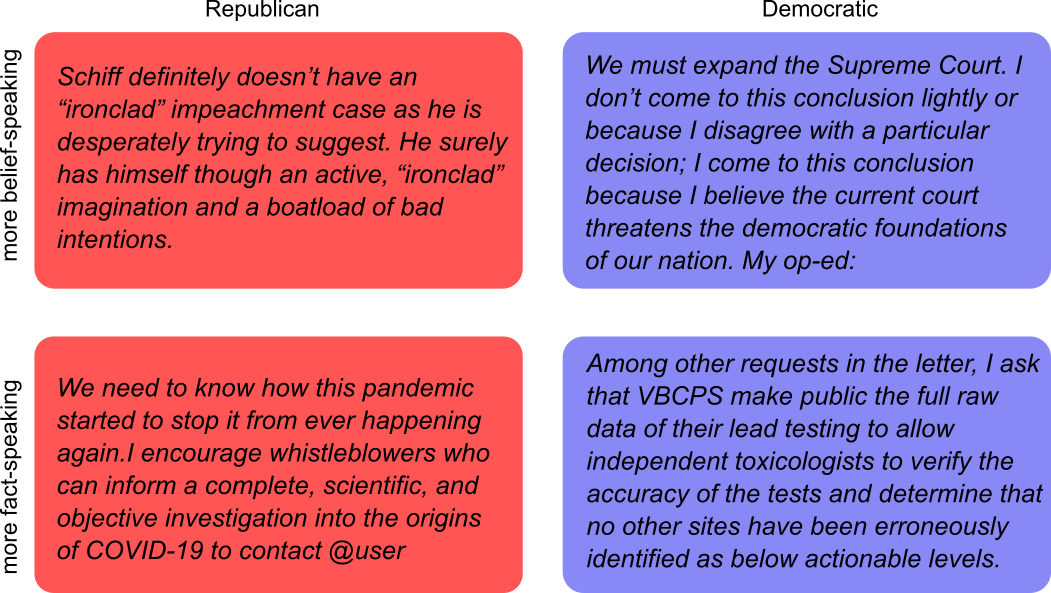Beyond Honesty: Understanding Facts and Beliefs in U.S. Political Discourse
Published in Social Sciences

The rise of online misinformation is a growing concern for democracies, particularly as social media becomes a major platform for political communication and news consumption. Misinformation takes various forms, such as conspiracy theories, propaganda, false news, and deep fakes. Its impact reverberates across critical societal fronts, eroding trust in scientific institutions, fueling political polarization, and fostering skepticism.
Misinformation can spread either unintentionally or intentionally. Unintentional spread happens when people share information they believe to be true, but which is actually false. By contrast, intentional spread (also known as 'disinformation') occurs when individuals or groups purposely promote false information to push a certain viewpoint or agenda, often with adverse consequences for society.
For example, in January 2021, supporters of the losing candidate of the 2020 presidential election, Donald Trump, stormed the Capitol based on his unfounded claims of election fraud. Surprisingly, despite Trump's consistent falsehoods (more than 30,000 false claims over 4 years), many of his followers not only supported him during his presidency but also considered him to be honest. One interpretation of this phenomenon is that when some social groups feel marginalized or distrustful of the political establishment, a dishonest leader can appear genuine to them by speaking what they perceive as suppressed truths. However, this leads to a question: How can someone deceive others while still appearing honest to them?
In a recent article published in Nature Human Behaviour, our team attempted to answer this puzzle by proposing a revised conception of honesty. We suggest that we should be moving away from a simple approach based solely on evidence (i.e., honesty as either telling the truth or lying by negating facts) to a more complex idea where both commitment to personal beliefs and adherence to factual accuracy coexist.
This new view of honesty proposes two components: 'fact-speaking', which involves seeking accurate information and updating beliefs accordingly, and 'belief-speaking', which is expressing personal thoughts and feelings sincerely regardless of their accuracy. We examined the presence of these two components in the U.S. political discourse by collecting tweets posted by members of both houses of Congress over the last decade and observing how they related to misinformation spread by politicians.
Identifying belief- and fact-speaking in our corpus required several steps. To start with, we created two lists of keywords assumed to be representative of the two categories. One approach would have then checked for the presence of these keywords in the text, and categorized tweets as either belief- or fact-speaking according to their frequency. But this approach has several limitations. For example, it does not deal well with texts having the same number of keywords in each of the components. Moreover, a simple keyword count would not capture text that did not contain any keywords but was nonetheless expressing a closely related sentiment. Therefore, we decided to adopt a more robust method by employing word embeddings. These consist of numerical representations of words and allow us to take into account the context in which our keywords occur in the language overall. We used word embeddings to calculate the 'distance' (i.e., cosine similarity) between each tweet and our dictionaries, thereby giving each tweet two similarity scores, one for each honesty dimension, that indicated to what extent belief-speaking and fact-speaking were present in the text. The figure below shows examples of tweets with high similarity scores for belief-speaking and fact-speaking by both parties.

After identifying the two components in the texts, we observed an increase in both belief-speaking and fact-speaking in tweets from both Democrats and Republicans, especially after the 2016 presidential elections.
We also explored the connection between belief- and fact-speaking and the sharing of low-quality information by U.S. politicians. Using NewsGuard, a professional database that provides indexes of trustworthiness for news domains (without analyzing or fact-checking individual items of content), we assessed the quality of news sources that these politicians linked to in their tweets. We found that, for Republicans only, an increase in belief-speaking in the tweet accompanying the news link was associated with sharing of low-quality information. Conversely, an increase in fact-speaking in the tweet corresponded to an increase in information trustworthiness. For Democrats, neither belief-speaking nor fact-speaking seemed to have an effect on information trustworthiness, which was found to be generally higher than for Republicans here, and also in another study we conducted earlier.

What can these outcomes tell us? First, the rise of belief-speaking and fact-speaking in online discussions by both parties might reflect the growing focus on “fake news” in political conversations. On the one hand, there's an emphasis on personal beliefs, while on the other, there's an attempt to provide accurate information to counter misleading content.
Secondly, our analysis suggests that belief-speaking might serve as a 'gateway' to sharing poor-quality information. When Republican politicians rely more on their beliefs and feelings rather than evidence in their public-facing communication, they are more likely to share information that is not very reliable. But why does this happen? One possible reason involves another finding of our study, namely that belief-speaking is linked to negative emotions. Republican politicians might wish to use negative language to criticize Democrats, and this goal is most readily achieved by sharing low-quality information.
Going back to our initial puzzle about how politicians can still be perceived as honest even when they do not not stick to the facts in their communication, our study does not deliver a definite answer. However, when we considered the election results from the 2020 election, we found that belief-speaking and sharing of low-quality information did not hurt candidates in terms of votes.
Our results do not imply that belief-speaking should be avoided by politicians in all circumstances. A democracy also involves the contestation of competing ideas that people may hold passionately. However, a democracy relying solely on belief-speaking can encounter serious problems. Democracies need a shared understanding of basic truths for people to work together effectively. To build this foundation of common knowledge, democratic discussions must go beyond just expressing personal beliefs. In fact, democratic politics requires leaders to speak based on facts and evidence. Ignoring crucial information, such as rejecting advice from experts who criticize their preferred health policies, can be harmful.
Follow the Topic
-
Nature Human Behaviour

Drawing from a broad spectrum of social, biological, health, and physical science disciplines, this journal publishes research of outstanding significance into any aspect of individual or collective human behaviour.



Please sign in or register for FREE
If you are a registered user on Research Communities by Springer Nature, please sign in